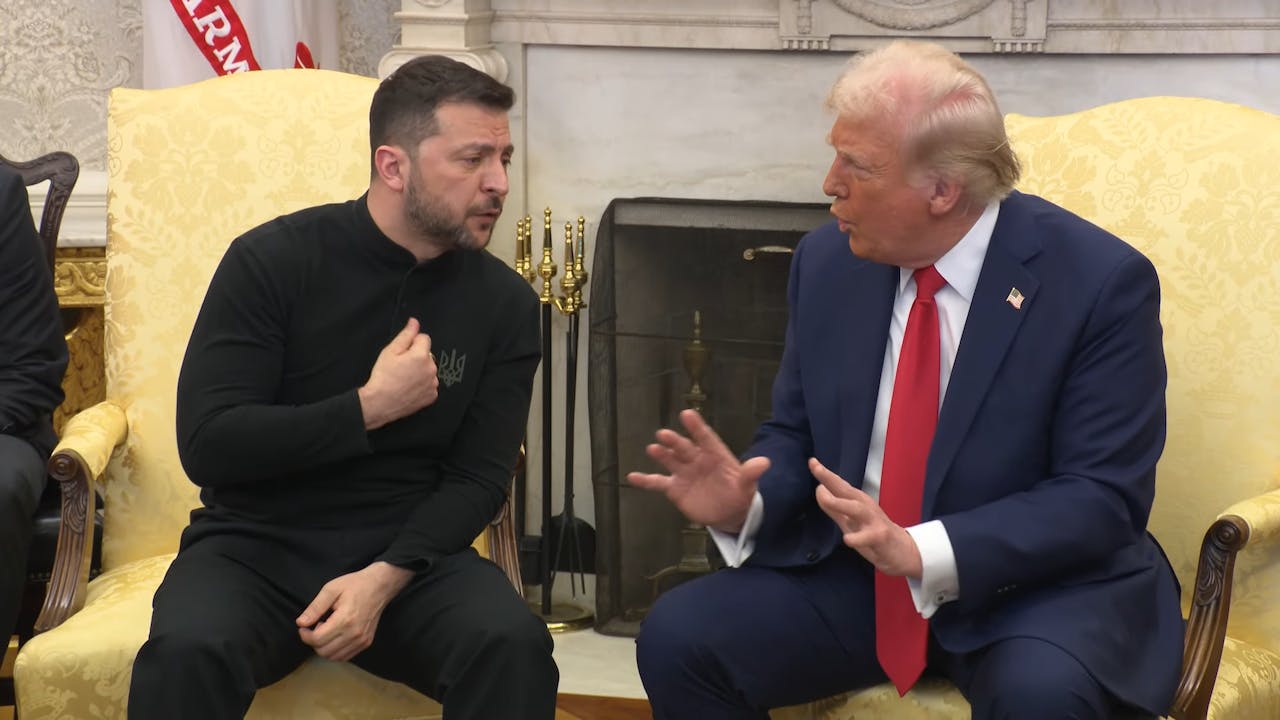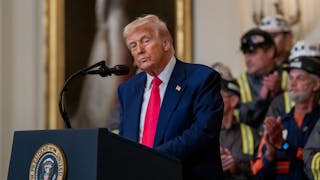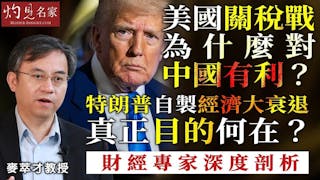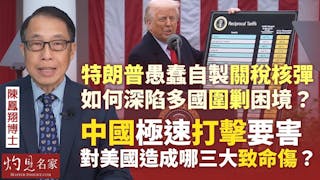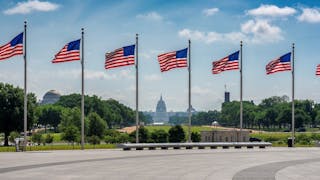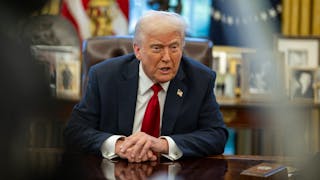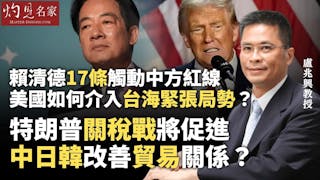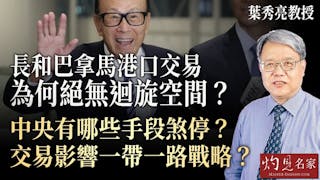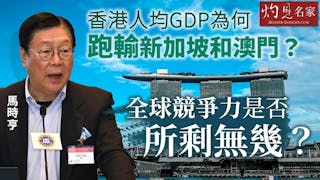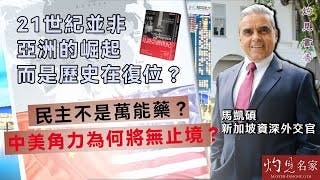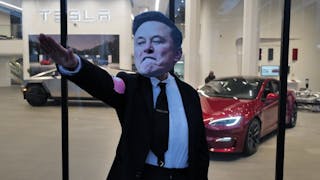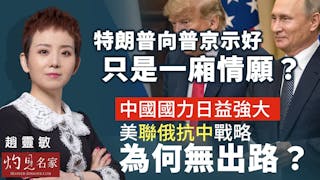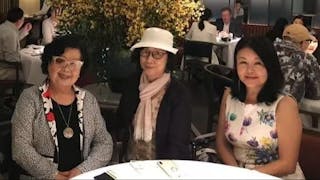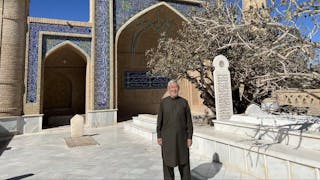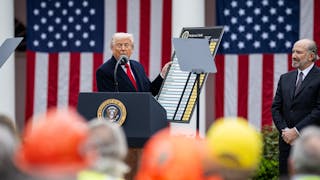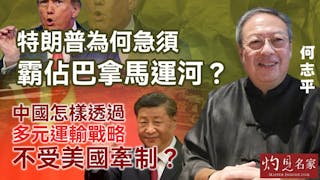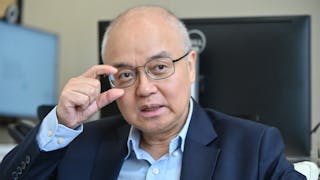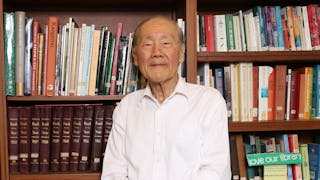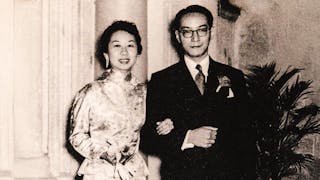烏克蘭總統澤連斯基與美國總統特朗普、副總統萬斯在白宮會面,原為簽署一項關係俄烏停火的稀土金屬協議,卻失控演變為雙方在全球媒體面前互嗆,這段震撼全球的吵架場面對瞬息萬變的世界政治、搖擺不定的美國外交政策和特朗普式美國主義產生了巨大影響。
美國新政府從利用關稅政策,以至要求烏克蘭就其豐富的礦產資源開採權達成協議,試圖利用商業交易來推動其外交路線,這種做法讓人震驚。如果說支持人權和民主是美國二戰後外交政策的基石,那麼我們最近所看到的就是美國外交政策的巨大轉變。如果美國領導人將公平的商業交易視為外交政策不可或缺的要素,那麼其作為人權和民主捍衛者的軟實力就已經受到嚴重削弱。
烏克蘭實行西方式民主,澤連斯基也是由烏克蘭人民選舉產生,卻受到特朗普和萬斯相當惡劣且不尊重的對待。特朗普坦言沒有美國的參與,烏克蘭沒有和俄羅斯討價還價的籌碼,這說法尚可令人信服,但美國方面或許應該說服澤連斯基,烏克蘭將如何從一項似乎對其極為不利的協議中獲得哪些好處。
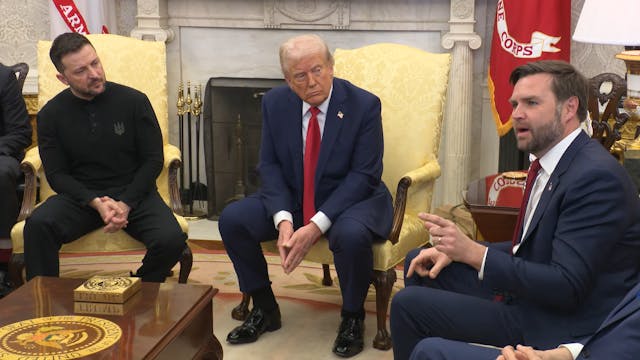
斥責澤連斯基對美不感恩
美烏會面擦出火花,最先是從澤連斯基與萬斯的爭論開始。萬斯批評拜登政府在應對俄羅斯入侵烏克蘭表現不濟,特朗普其後在與澤連斯基的對話中亦批評了前總統拜登,澤連斯基則抱怨特朗普政府與俄過於友善,觸發萬斯反唇相譏,指責其沒有採取有效的外交手段解決問題,甚至「不感恩」美國對烏克蘭的軍事支持。
然而,當澤連斯基提到俄羅斯如何漠視先前與烏的協議,並且在2014年入侵克里米亞,當時美國也沒有干預,萬斯和特朗普對此就不置可否,他倆似乎都無法理解澤連斯基闡述的主要論點,而且,澤連斯基在對話中幾乎沒有機會闡明自己的觀點。
正如澤連斯基所說,假如俄羅斯過往在違反協議方面劣績斑斑,包括1994年至1996年入侵車臣,以及2014年入侵且併吞克里米亞,那麼美國對俄外交政策的急劇轉變,不僅代表着美國對前蘇聯的遏制政策已逆轉為綏靖政策。更令人擔憂的是,1938年9月英國首相張伯倫與德國希特拉簽署的《慕尼黑協定》,被認為助長了後者發起二戰的野心。同樣,特朗普一直對美國媒體表示,他喜歡俄羅斯總統普京,這樣的場景是否似曾相識?
如果俄羅斯吞併克里米亞和烏東部分領土,是旨在創建大俄羅斯的帝國版圖,那麼大俄羅斯的擴張至少會對中歐一些波羅的海小國構成威脅嗎?因為普京曾表示,烏克蘭是蘇維埃下的烏克蘭,人類史上從未有過烏克蘭國。
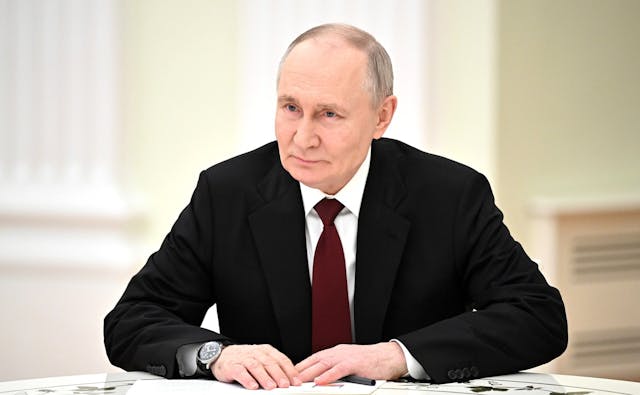
普京冀恢復前蘇聯榮光
俄羅斯將烏克蘭納入大俄羅斯,其擴張領土的野心已昭然若揭。如果特朗普新政府領導下的美國能夠與普京達成協議,能否保證俄羅斯不會侵犯其他獨立歐洲國家的任何領土?如果普京領導下的俄羅斯懷着恢復前蘇聯邊界的遠大理想,這種願望會刺激第三次世界大戰嗎?若然屬實,澤連斯基真的會如特朗普的質疑那樣,將世界推入第三次世界大戰嗎?如果美國現在對俄羅斯採取綏靖政策而不是傳統的遏制政策,美國外交政策的遽變,是否會導致第三次世界大戰再次從歐洲開始?也許就是源於普京企圖恢復大俄羅斯帝國榮光的關係?
作為烏克蘭民族主義者,澤連斯基在與特朗普和萬斯的會晤中,始終堅守烏克蘭主權和領土完整的大原則,沒有作出任何讓步,但其會談態度誠懇。雖然萬斯認為澤連斯基不尊重美國,但客觀而言,當美國領導人強勢地批評澤連斯基時,他回應的語氣已相當溫和。
在美烏領導人會面不歡而散後,法國、德國、英國等歐洲國家繼續聲援烏克蘭,這體現了以北約制衡前蘇聯和現俄羅斯為中心的歐洲地緣政治格局仍然不變。平情而論,在2022年2月俄羅斯入侵烏克蘭之前,烏克蘭加入北約的意圖引發了俄羅斯的國家安全疑慮、導致俄羅斯入侵烏克蘭的特別軍事行動。如果特朗普新政府希望烏克蘭能夠充當俄羅斯與其他歐洲國家之間的緩衝區,那麼特朗普和萬斯或許應該與澤連斯基舉行閉門會議來解決雙方分歧。
誠然,美烏談判破局絕對不利於美國在俄烏戰爭中實現和平的努力。因此,特朗普的國家安全顧問官員必須認真重新思考,美方應如何將烏克蘭拉回談判桌,並且認真考慮和保護烏克蘭的利益。外交是平衡相關利害關係人的利益衝突,而不是把某種世界觀強加給另一個國家。
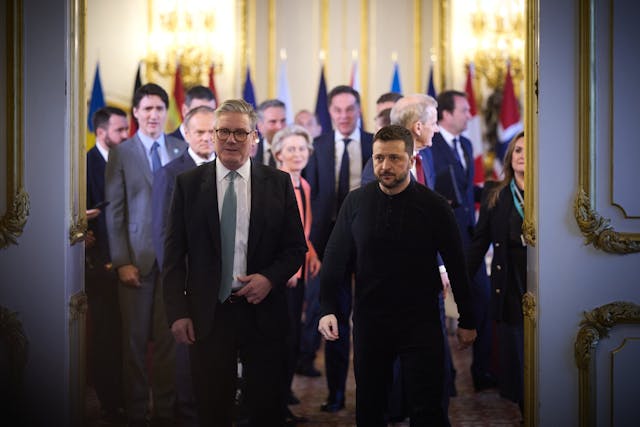
特朗普被視為美國「救世主」
美國外交政策的遽變對該國民主產生了巨大影響。當特朗普重返白宮,大多數支持他的美國選民將經濟刺激等國內議題,視為美國外交關係之上的優先事項,因此特朗普及共和黨被這些選民視為美國的「救世主」,但他們似乎不知道新政府將對世界政治產生什麼影響。假設民主的前提是選民是理性的,那麼讓特朗普再次掌權的美國選民只可以說是部分理性,因為他們似乎關注的是國內利益,而不是美國外交政策的影響。
總而言之,美烏領導人在媒體前的激辯,對世界和美國政治都產生了重要影響。烏克蘭遭到入侵,已經造成許多人命損失及痛苦,美國對烏克蘭的新外交政策卻急於從稀土金屬協議入手。如果商業交易是特朗普式美國主義的核心,那麼美國的軟實力將迅速下降,但也許共和黨人尚未意識到這種變化。
此外,美國民主政體的外交政策和全球領導力正在發生巨大變化,尤其是特朗普新政府黨派之爭不絕,他不斷批評民主黨和前拜登政府,這表明美國民主政體的外交政策出現了重大不連續性。
假設對俄羅斯的綏靖政策有利於世界和平,但大俄羅斯的擴張野心只會被限制在烏克蘭東部嗎?美國對俄羅斯的綏靖政策是否類似張伯倫對希特勒德國的綏靖政策?最引人注目的是,澤連斯基的烏克蘭民族主義正抗衡特朗普式美國主義、美國的霸權主義和新經濟帝國主義,而美國軟實力正快速衰退,這趨勢有待進一步關注與觀察。
Critical reflections on the Zelensky-Trump-Vance meeting
The short, open but unhappy dialogue between Ukrainian President Zelensky, on the one hand, and US President Donald Trump and Vice President J.D. Vance in the Oval Office was seen worldwide, with tremendous implications for evolving world politics, the changing American foreign policy, and Trumpian Americanism.
First and foremost, it is striking how the new US administration is trying to utilise business transactions to deal with its foreign policies, ranging from the use of tariffs to the demand for reaching a deal with Ukraine on its minerals and rich resources. If the support of human rights and democracy was the pillar of US foreign policy after the Second World War, what we are witnessing is a drastic change from pro-human rights and pro-democracy values to business values. The question is that if US leaders treat equal business transactions as an indispensable element of American foreign policy, then its soft power of being a champion of human rights and democracy has already been severely undermined. Ukraine, as a Western-style democracy, and President Zelensky, who was elected by the people of Ukraine, were treated quite badly by US President Trump and Vice President Vance. Although President Trump was convincing when he argued that Zelensky had no bargaining cards, the US side should perhaps convince Zelensky what Ukraine would acquire from a deal that appears to put Ukraine in a highly unfavourable position.
Second, when Vice President Vance challenged President Zelensky to adopt diplomacy and to be thankful for US military support, the former criticised the Biden administration for its foreign policy in dealing with the Russian invasion of Ukraine. President Trump also criticised Biden in the dialogue with Zelensky. Interestingly, when Zelensky mentioned how Russia ignored previous deals with Ukraine and invaded Crimea in 2014 without US intervention, Vance and Trump did not really respond. It seemed that both President Trump and Vice President Vance could not catch the main argument articulated by Zelensky, who was given little chance to articulate his view in the dialogue.
Third, if Russia had a record of “breaking” agreements, as argued by Zelensky—such as its invasion of Chechnya from 1994 to 1996 and its invasion and then annexation of Crimea in 2014—is the drastic U-turn of US foreign policy towards Russia representing not only a reversal of the former US containment policy towards the former Soviet Union but also an appeasement policy that runs the risk of making the Trump-Vance leadership parallel to UK Prime Minister Neville Chamberlain’s appeasement policy towards Hitler during the Munich Conference in September 1938? President Trump told the US media that he likes Russian President Putin.
Interestingly, if Russia is eager to create its Greater Russia by swallowing not only Crimea but also at least the eastern part of Ukraine, is the expansion of Greater Russia posing a danger to at least some small Baltic states in Central Europe? President Putin once said that Ukraine belonged to Soviet Ukraine and that there had never been any Ukraine “in the history of humanity.”
The territorial ambition of Russia to swallow Ukraine into the orbit of Greater Russia is obvious. Will there be any guarantee that Russia, if the US under the new Trump administration can come up with a deal with Putin, would not transgress into any other territories of the other independent European countries? If Russia under Putin is imbued with the ideal of restoring the previous boundaries of the former Soviet Union, would this desire stimulate a Third World War? If so, is Zelensky really pushing the world into a Third World War, as Trump questioned him twice in the heated encounter? If the US is now adopting an appeasement policy towards Russia rather than its traditional containment policy, would this new drift lead to a Third World War starting from Europe again, next time perhaps originating from the ideal of restoring Greater Russia instead of the Greater Germany territories under Hitler?
Fourth, what was striking was that President Zelensky stayed persistent and honest in the meeting with Trump and Vance, fully displaying his Ukrainian nationalism that upholds Ukraine’s sovereignty and territorial integrity. While Vance argued that Zelensky was “disrespectful,” it looked as if the top US leaders questioned and argued with Zelensky in a dominant manner, from an objective perspective. As a Ukrainian nationalist, Zelensky did not make any concession in the meeting. In fact, Zelensky was already quite mild and calm in the dialogue, questioning the meaning of diplomacy as raised by Vance.
Fifth, after the Zelensky-Trump-Vance meeting, European countries such as France, Germany and the UK continued to support Ukraine—an illustration of continuity in the geopolitics of Europe, in which NATO has consistently adopted an approach of checking and balancing the power of the former Soviet Union and currently Russia. Indeed, from an objective viewpoint, before the Russian invasion of Ukraine in February 2022, the intention of Ukraine to join NATO was an important move that triggered the national security concern of Greater Russia, leading to the Russian invasion of Ukraine. If the US, under the new Trump administration, is eager to restore Ukraine as a buffer zone between Russia and other European countries, then President Trump and Vice President Vance should perhaps adopt a closed-door meeting with President Zelensky. Having an open argument with Zelensky was by no means conducive to effective US diplomacy in bringing about peace in the Russian war with Ukraine. As such, Trump’s national security advisers must rethink carefully how the US side should bring Ukraine back to the negotiating table and how Ukrainian interests would be truly considered and protected. Diplomacy is about balancing the conflicting interests of the stakeholders concerned instead of imposing a particular worldview onto another country with an image of US economic imperialism.
Sixth, the U-turn in US foreign policy has tremendous implications for American democracy. When American voters participated in the US presidential election that brought Trump to power again, most of them saw domestic issues, such as economic stimulation, as a priority over US foreign relations. As such, Trump and his Republican Party were seen as the “saviour” of America from the perspective of voters supporting the Republicans. However, these voters seemed ignorant of what impact the new Trump administration would have on world politics. As such, if democracy is predicated on the assumption that voters are rational, then it can be argued that the American voters who brought Trump to presidential power again were only partially rational, for they appeared to focus on domestic interests rather than the implications of US foreign policy. Similarly, when Trump’s opponent, Kamala Harris, ran in the presidential election, her campaign advisers missed a golden opportunity to highlight her foreign policy differences from Trump and to emphasise how another Trump administration would have “detrimental” impacts on world politics. In short, democracy, judging from the US presidential election and its aftermath, can be highly problematic because a new leader who is voted into power has tremendous authority to change domestic and foreign policies through presidential directives and business-type diplomatic transactions. American voters who participated in the US presidential election in 2024 might not have fully comprehended how the previous American global leadership and image would be transformed so rapidly and shockingly.
In conclusion, the fiery meeting between President Zelensky, President Trump and Vice President Vance had important implications for world politics and US politics. The new US foreign policy towards Ukraine is eager to extract minerals from a country that has already been invaded, with the loss and suffering of many people. If business transactions are a new pillar of Trumpian Americanism, US soft power is declining rapidly, but perhaps loyal Republicans in the US may not recognise this rapid development. Furthermore, democracy in the US is witnessing a drastic change in its foreign policy and global leadership, especially as the new Trump administration is so partisan that it continues to criticise the Democratic Party and the previous Joe Biden government—evidence showing that US democracy displays a drastic discontinuity in its foreign policy.
Also, the appeasement policy towards Russia assumes that any deal would be conducive to world peace, but will Greater Russia’s territorial ambitions stop at the eastern part of Ukraine only? Is the US appeasement policy towards Russia resembling Chamberlain’s appeasement policy towards Hitler’s Germany? Most strikingly, Zelensky’s Ukrainian nationalism has resisted and opposed Trumpian Americanism, American hegemonism and new US economic imperialism. The soft power of the US is now fading rapidly—a trajectory that deserves our further attention and observation. Finally, American democracy appears to discredit itself because voters in the 2024 presidential election might have paid excessive attention to domestic issues—a normal psyche of voters—instead of pondering much deeper into the longer-term implications of a sudden and drastic transformation of US foreign policy towards Ukraine and some other parts of the world.
原刊於澳門新聞通訊社(MNA)網站,本社獲作者授權轉載。(原文按此)





